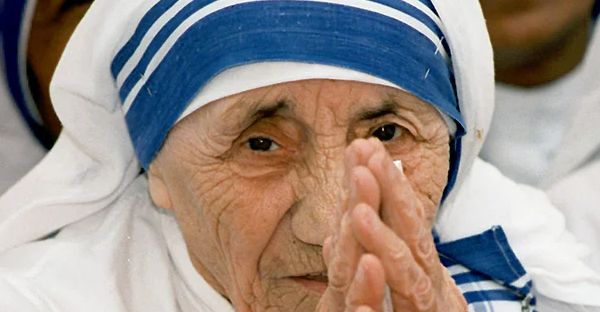[ad_1]

Mother Teresa greeting people at the Missionaries of Charity For Destitute Children in New Delhi in 1997. (Photograph: Ravi Raveendran/AFP/Getty)
Nun’s former lawyer says he will take legal action against unauthorised use of design to combat ‘misuse’ of reputation
The white, blue-rimmed cotton sari made famous by Saint Teresa of Kolkata has been trademarked in a case the nun’s former lawyer has claimed as a first for a religious uniform anywhere in the world.
The design of the sari, which Teresa is said to have purchased from a Kolkata market the evening she was granted permission to start working in the city’s slums, is now the exclusive intellectual property of the Missionaries of Charity, the order the nun founded nearly 70 years ago.
A lawyer for the order, Biswajit Sarkar, said he had applied for the trademark in 2013 to combat the “misuse” of the saint’s reputation, often for commercial gain. The trademark was formally granted in early 2016 but only recently publicised.
He said he would now take “severe” legal action against unauthorised use of the design, even by charitable enterprises that the order’s nuns had been willing to tolerate.
“There are many organisations starting schools naming themselves after Mother Teresa, and wearing the uniform, where the Missionaries of Charity have no connection,” he said.
Teachers at some schools named after Teresa had been writing to the Missionaries of Charity complaining about late salary payments, unaware their schools were separate entities, he said.
A cooperative bank had also been established in the nun’s name, he said, and in another instance, religious books were being published with the blue-striped trimming, giving the impression they were endorsed by the Kolkata-based order.
Sarkar, who has also had the name Mother Teresa trademarked, said the “soft-hearted” nuns had initially objected to also copyrighting the uniform. “They don’t like taking court cases,” he said. “They say, ‘One day the people will understand they are doing the wrong thing.’
“But we cannot allow that. Now if anybody is misrepresenting the Missionaries of Charity we can take severe legal action.”
He said no exceptions would be made for use of the pattern by other religious orders, or by not-for-profit enterprises.
“Even the nuns were asking me, if the people are not using it for commercial gains, should we stop them?” he said.
“But whether it is for commercial gain or not is not the issue. We are thinking about our identity. If the blue pattern, which is unique in the world, is diluted or used by the public, then one fine morning the organisation will lose their identity.”
Click here to read more.
SOURCE: The Guardian
Michael Safi
Related
[ad_2]
Source link
